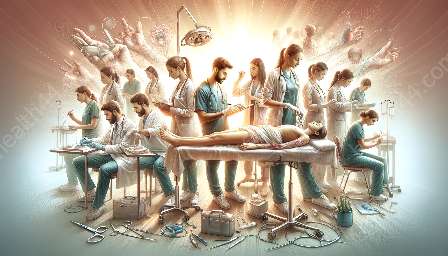Basic life support and first aid are critical skills that can make a difference in emergency situations. Whether you are a healthcare professional undergoing clinical skills training or an individual interested in health education and medical training, understanding these fundamental concepts can help you provide immediate care and support to those in need.
The Importance of Basic Life Support and First Aid
Basic life support (BLS) involves recognizing and responding to life-threatening emergencies, including cardiac arrest, choking, and drowning. It encompasses a set of essential skills that can help sustain life and minimize the impact of sudden illness or injury until advanced medical help arrives. First aid, on the other hand, involves the provision of initial care for an illness or injury, aiming to preserve life, prevent the condition from worsening, and promote recovery.
These skills are vital for healthcare professionals, as well as individuals in non-medical settings, as emergencies can occur anywhere and at any time. By being prepared with the knowledge and skills to perform BLS and first aid, you can play a crucial role in saving lives and promoting positive health outcomes.
Key Concepts of Basic Life Support
Basic life support is based on several key concepts that form the foundation of emergency care. These concepts include:
- Recognition of an emergency situation
- Activation of the emergency response system
- Assessment of the individual's condition
- Initiation of cardiopulmonary resuscitation (CPR) and the use of an automated external defibrillator (AED)
- Management of choking and airway obstruction
These concepts are central to the delivery of effective BLS and are crucial components of clinical skills training for healthcare professionals.
First Aid Procedures: A Comprehensive Approach
First aid encompasses a wide range of procedures to address various medical emergencies, injuries, and sudden illnesses. From controlling bleeding and treating burns to managing fractures and providing care for heat-related conditions, the ability to administer first aid can significantly impact an individual's recovery and well-being.
Additionally, understanding the principles of first aid prepares individuals to respond to emergencies such as allergic reactions, seizures, and diabetic emergencies. Through proper training and education, individuals can gain the confidence to provide timely and appropriate first aid interventions.
Integration with Clinical Skills Training
For those undergoing clinical skills training, incorporating basic life support and first aid into the curriculum is essential. These skills lay the groundwork for providing immediate care in various healthcare settings, including hospitals, clinics, and community environments. By integrating BLS and first aid training into clinical education, future healthcare professionals can enhance their readiness to respond to emergencies and contribute to better patient outcomes.
Health Education and Medical Training
Basic life support and first aid are integral components of health education and medical training. In educational settings, these skills can be taught to students, educators, and support staff, fostering a safe and prepared environment for learning and everyday activities. Moreover, ongoing medical training programs can equip healthcare providers with the latest guidelines and techniques in BLS and first aid, ensuring that they are adept at responding to the dynamic nature of emergency care.
Conclusion
Understanding basic life support and first aid is paramount for healthcare professionals, educators, and individuals alike. By embracing these essential skills, you can become a proactive responder in emergency situations, contributing to the well-being and safety of those around you. Whether you are pursuing clinical skills training or seeking to enhance your knowledge of emergency care, the principles of basic life support and first aid serve as invaluable tools for making a positive impact in the realm of healthcare and beyond.



